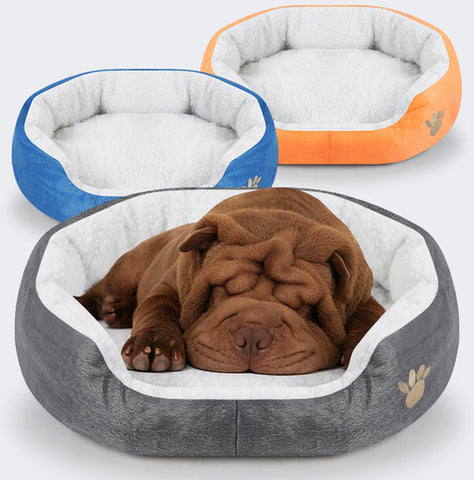How To Manage Your Dogs Weight

A crucial part of dog ownership is weight management, as ample research has shown that overweight dogs are more likely to suffer from many ailments. If you want your dog to lose weight or are looking for weight gain techniques, it's crucial to understand weight management. If you're looking for information on how much your four-legged friend should be eating, when they should be getting exercise, and what type of diet is suitable, this blog post is the perfect place for you! Join us as we outline simple ways to ensure our pets remain fit, strong, and vibrant.
First, Why Is Your Dog Underweight?
Picky Eater
Some dogs have difficulty putting on weight due to being picky eaters. They may turn up their nose at specific types of food or refuse to eat altogether. Additionally, some breeds have a naturally slender build and struggle to gain weight regardless of their diet. To help your picky eater in gaining weight, consider feeding them smaller meals throughout the day and appealing to their taste buds with high-calorie foods like cheese or peanut butter. You can check dog treats online or consult with your veterinarian to ensure your dog receives the proper nutrition for their specific needs and meets weight gain requirements.
Stress or Anxiety
Like humans, dogs can experience stress and anxiety. These emotional states can lead to weight loss, as dogs may not feel inclined to eat when upset. Separation anxiety, changes in routine, and fear of loud noises like fireworks can all trigger stress in a dog's health. To address this issue, it's essential to identify and remove the source of your dog's anxiety. Additionally, providing your dog a safe and comfortable environment can help alleviate their emotional distress and remove underweight dog issues.
Sickness or Injury
It could indicate an underlying medical issue if your typically healthy dog suddenly loses weight. Certain illnesses like cancer or thyroid problems can cause dog weight loss. Additionally, injuries or dental issues can make it difficult for dogs to eat and maintain their average weight. If you suspect your dog is underweight due to illness or injury, it's essential to seek veterinary care as soon as possible. Early detection and treatment can significantly improve your dog's chances of full recovery.
Too Much or Too Little Activity
Maintaining a healthy weight in dogs is crucial for their overall well-being. One reason a dog is underweight could be too much or too little physical activity. A dog that is not getting enough exercise is prone to becoming overweight. At the same time, a dog that is too active or involved in strenuous activities may need a higher caloric intake to prevent rapid weight loss. Moreover, high-energy breeds like hunting dogs require more physical stimulation than others. Owners must ensure they provide their dogs with the right amount of exercise and monitor their weight to avoid health complications.
Age
Age is another crucial factor that plays a role in a dog's weight. Dogs undergo different metabolic changes as they age, and their nutritional needs vary. Older dogs tend to have a slower metabolism, which reduces caloric requirements. They may lose their appetite due to dental issues or digestive problems. Puppies, on the other hand, require a well-balanced diet for growth and development. Senior dogs and puppies require special diets and lower caloric intake compared to mature adult dogs.
Underfeeding
Another critical reason for a dog being an underweight dog is underfeeding. Some owners may need to pay more attention to their pet's dietary requirements and feed them less dog food than they need to maintain a healthy diet. Besides, dog food may not provide enough nutrients, and some dogs may have trouble digesting certain foods. A well-rounded diet must contain adequate protein, carbohydrates, fats, and vitamins to meet weight gain requirements. Dog owners must check the feeding guidelines on pet food packages and consult a veterinarian to determine the right amount and type of food to nourish their dog. Underfeeding can lead to several health problems, so providing dogs with the necessary nutrients in their diet is vital.
How To Tell if Your Dog Is a Healthy Weight
Your furry pal is the light of your life. You can't imagine spending a day without him. But it's essential to check his weight to ensure he is always at his best. How do you tell if your four-legged friend is a healthy weight? There are a few signs you should keep an eye out for. First is the rib test: if you can feel the ribs with light pressure but can't see them, your pup is at the right weight. Next, check for a visible waistline and a tucked-up tummy. Lastly, ensure your pup isn't carrying any extra weight around its neck or shoulders. By keeping your furry friend at a healthy weight, you'll have a happier, longer life together, filled with plenty of tail wags and belly rubs!
Tips on How To Put Weight On A Dog
Higher Protein Or Higher Fat Food to Gain Weight
Dogs gain weight with high-quality dog food. If your underweight dog needs to gain weight, one of the first things you should consider is changing its diet. Look for dog food with higher protein or fat content. Protein is the building block of lean muscles, while fat is an excellent energy source. Both can help your underweight dogs gain weight effectively. However, choosing suitable protein and fat sources is crucial. Look for those that come from high-quality animal sources like beef, chicken, salmon, and lamb. Make sure to consult with your vet before changing your dog's diet.
New Feeding Schedule for Weight Gain
Another approach to help your dog gain weight is to adjust their feeding schedule. Instead of free-feeding or giving two large meals per day, try giving your dog smaller but more frequent meals throughout the day. For instance, you can offer three to four smaller meals per day, depending on your dog's appetite and activity level. By doing so, you can ensure that your dog gets the nutrients they need without overloading its digestive system. Moreover, it can help stimulate their appetite, which is crucial for weight gain.
Sweet Potato And Pumpkin:
Sweet potato and pumpkin are excellent options to help your dog gain weight in a healthy way. They are both rich in dietary fiber, vitamins, and minerals that can boost your dog's overall health. Sweet potatoes are an exceptional source of complex carbohydrates that can provide your dog with sustained energy. Pumpkin, on the other hand, is a low-calorie vegetable that contains reasonable amounts of dietary fiber to aid in digestion. You can add boiled, mashed sweet potatoes or pureed pumpkin to your dog's diet as a healthy and nutritious supplement to help them gain weight.
More Exercise For Dog Gain Weight
One of the best ways to help your dog gain weight is by increasing their daily exercise routine. Regular exercise not only helps your furry friend build muscle, but it can also stimulate their appetite. However, it is essential to start slowly and gradually increase the intensity and duration of their activity to avoid any possible strain or injury. Engage in activities that are suitable for your dog's breed and size, such as playing fetch or going for brisk walks. Also, ensure that your dog has access to plenty of fresh water before, during, and after exercise to help prevent dehydration.
Try Wet or Fresh Foods
Another effective way to help your dog gain weight is by incorporating wet or fresh foods into its diet. These foods are typically more palatable and contain higher moisture content, which can help stimulate their appetite. Wet food may also have more calories and nutrients than dry kibble. Additionally, fresh, whole foods like meats, vegetables, and fruits can provide your dog with essential vitamins, minerals, and fiber. Dog supply stores are equipped with products that benefit your furry pal. Just make sure to consult with your veterinarian before making any significant dietary changes to ensure that your dog is getting all the nutrients they need to maintain a healthy weight.
Conclusion
Ultimately, caring for your dog's weight is about more than just tracking the numbers; it's about giving your pup the best life possible. It can be daunting to tackle weight management and nutrition alone, so feel free to reach out for help from your vet. Just like you do for yourself, ensuring your dog stays at a healthy weight will provide that added layer of protection against potential health issues later down the line. Utilize the tips in this blog post and work with a professional team, if needed, to make sure all these pieces fall into place. And, as an added bonus, when you invest in a healthier diet and lifestyle for your pup, you're investing in better physical activities together – like frequent runs or games of tug-of-war! You can both enjoy a happier life by helping manage those scales together. Always remember Clean eating is the best kind of dog treating!









